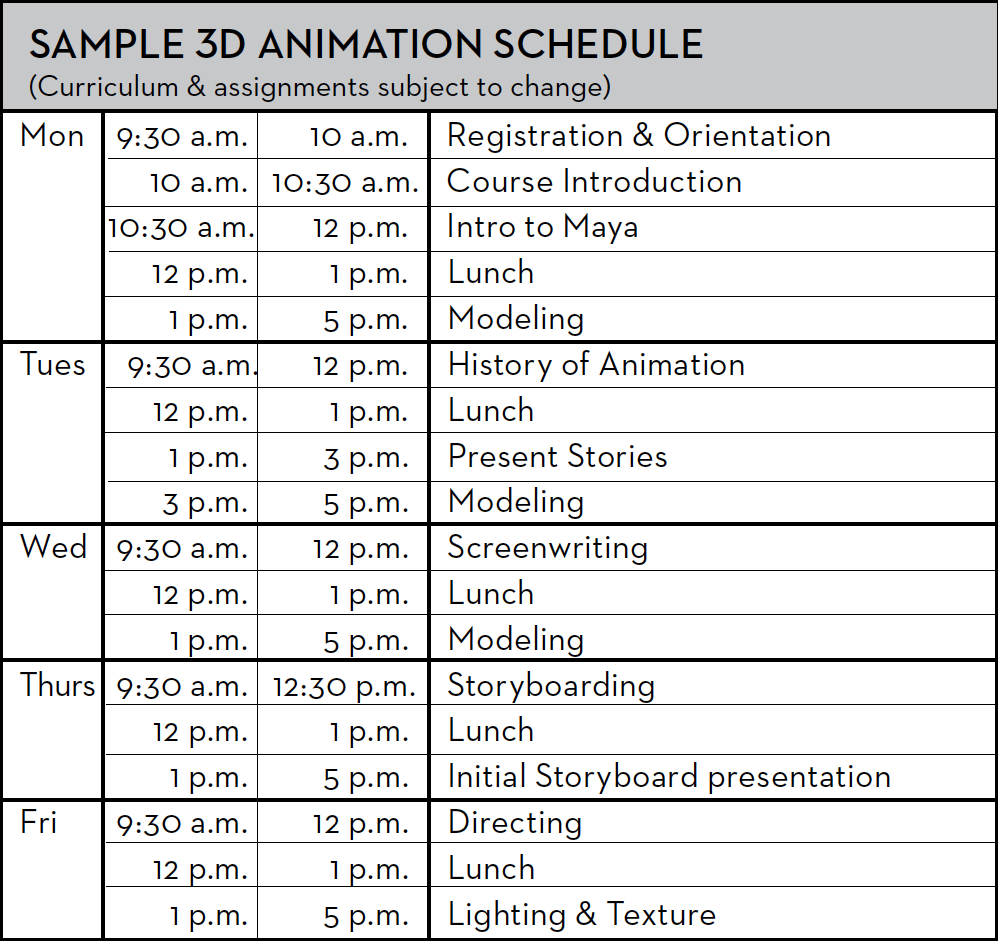Welcome!
Welcome to the New York Film Academy’s teen summer camps in Los Angeles! Our Los Angeles location offers intensive, conservatory-style workshops in filmmaking, acting for film, screenwriting, photography, 3D animation and game design. Whatever program you’re in, be ready to commit yourselves to an intensive, exhilarating and creatively enriching experience!
We ask that both parents and students read through this packet, which provides information that will prove invaluable in orienting yourselves to our program.
We look forward to seeing you this summer!
NYFA at a Glance
MISSION STATEMENT
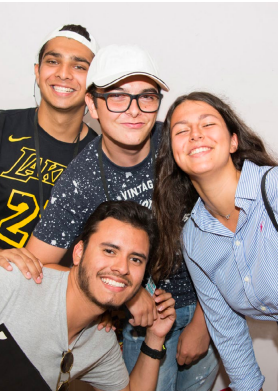 Through its educational programs, the New York Film Academy (“NYFA”) propagates visual literacy and visual storytelling through hands-on intensive learning. It seeks to make visual storytelling education accessible to the most diverse, international, and broadest possible spectrum of campers, and to hone the skills of future professionals so that they may one day serve the visual storytelling arts as industry leaders.
Through its educational programs, the New York Film Academy (“NYFA”) propagates visual literacy and visual storytelling through hands-on intensive learning. It seeks to make visual storytelling education accessible to the most diverse, international, and broadest possible spectrum of campers, and to hone the skills of future professionals so that they may one day serve the visual storytelling arts as industry leaders.
EDUCATIONAL PHILOSOPHY
NYFA Teen Programs are based on the philosophy of “learn by doing.” Every curriculum stems from that belief. NYFA believes that the most effective way for our campers to master their chosen craft is to immediately start creating their own work in a hands-on intensive working environment.
NYFA VALUES
Leadership – To be a successful artist in these collaborative fields, leadership qualities are important. Through the work and development of the projects that campers make or perform in, they can enhance their ability to engage others to work together and create impactful art.
Creativity – We encourage campers to think outside the box. The challenges inherent in these crafts force campers to develop creative solutions to achieve desired results.
Collaboration – Quality leadership and collaboration go hand in hand. To achieve educational and creative goals, campers must work together and often depend on their classmates’ assistance to execute their projects. Collaboration fosters the ability to conduct oneself with professionalism and respect to others and their creativity.
Discipline – The discipline required to create quality work is extraordinary. A camper will need to practice the art of discipline, and try their hand at a craft that requires full dedication to succeed.
Expression and Individuality – Through visual and performing arts, our campers have an extraordinary opportunity to express their point of view and discuss their thoughts, ideas and concerns. We encourage campers to use their own experiences to inform their work, which often results in truthful and moving storytelling.
OUR INSTRUCTORS
NYFA’s faculty members are active performing and visual arts professionals. They all have a passion for the arts including storytelling and teaching and are consistently given the highest praise from our campers.
STAFFING
The Director of Youth Programs supervises all Teen Program staff, which includes residential advisors, instructors and technical assistants. Questions regarding Camper Services should be directed to the Director of Youth Programs.
Registration
All NYFA camps have open enrollment, though NYFA prerequisites may apply for certain programs. No previous experience is required for Level I classes. The application for the camps may be filled out online. A deposit ($500) is required to secure the camper’s spot in the program of their choice. Once the application and the deposit have been made, the camper will receive an online packet containing forms that must be filled out by the camper and their parents/guardians. Such forms include Acknowledgment Form, housing request, airport pick up and drop off, medical conditions or allergies, etc.
Summer Camp Forms
Parents and students will need to fill out and sign all required forms ONLINE. You will receive an email with the subject line “NYFA Summer Camp Action Required” with a personalized link. Please follow the steps to complete the forms.
In addition to signing all required forms, you will need to submit a Health Examination Form, front and back copy of medical insurance card detailing health information (for student), and a CURRENT photo (of student). Click here to download the Health Examination Form.
If you have any questions, contact us at 818-333-3558 or email [email protected]
Arrival
Commuting students do not have scheduled activities or classes on the Sunday start date of the program. Please see the Registration/Orientation section for instructions on arrival.
Students electing to stay in New York Film Academy housing may also utilize our airport transportation from the Los Angeles International Airport (LAX) to the residence. Please submit the Arrival & Departure form online as soon as possible with the indicated travel information if you would like to take advantage of this service. There is a one-time transportation fee of $50.00 USD, which covers both pick-up and drop-off services.
Please book a flight to ARRIVE BETWEEN 10 a.m. and 3 p.m. on your arrival date! If you submit the Arrival & Departure form with flight information, a New York Film Academy representative will greet you at baggage claim. Representatives will be wearing New York Film Academy t-shirts.
It is very important that you arrive and depart on the listed start date and end date for your camp. We are unable to accommodate transportation or housing on alternate dates.
6-WEEK PROGRAMS:June 28, 2026 – August 08, 2026 |
3-WEEK PROGRAMS:June 28,2026 – July -18-2026 |
1-WEEK PROGRAMS:July 05, 2026 – July 11, 2026 |
If you choose to make your own travel arrangements from any airport, train station, or bus terminal to the residential housing, or if you are arriving by car, please see the travel directions listed below.
FROM LAX AIRPORT
Taxi cabs are $2.85 on the meter for every mile so we strongly suggest car services like Lyft, Uber or Opoli which have estimated flat rates. For the more economically-minded, you can follow the signs for Public Transportation, but please be aware it is quite a long commute via public transportation to Burbank from LAX.
FROM HOLLYWOOD BURBANK (BOB HOPE OR BUR) AIRPORT
Taxi metered costs begin at $2.85 every mile but Hollywood Burbank Airport is close to Campus and Residential Housing. Alternatively, car services like Lyft, Uber or Opoli are available at BUR.
BY CAR
As there are many points of entry into Burbank, it is advised that you use an online service to map your route.
Registration & Orientation
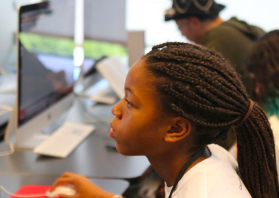 If all information, documents, and payments have been received, all students will be registered online during the week leading up to the program start date. Once registered, students will receive information about their NYFA student email account and a Welcome Letter Email from the Director of Youth Programs.
If all information, documents, and payments have been received, all students will be registered online during the week leading up to the program start date. Once registered, students will receive information about their NYFA student email account and a Welcome Letter Email from the Director of Youth Programs.
There will be a brief student orientation worked into the schedule on the first day of classes. Orientation, for students only, will cover student supervision and rules and regulations. Students will receive their schedule and NYFA Student ID upon arrival on the first day of classes.
Residential students will be shuttled to campus together to join the commuting students for orientation. Please see the Housing Move-in and Orientation section for instructions on arrival to the residential housing.
For Students Driving Themselves
We strongly urge commuting students on registration day, the first day of camp, to be dropped off by a guardian, family member, friend or to take a car service if necessary. This will give them time to understand the campus layout and the process of entering the building without the additional stress of LA traffic and parking on the first day. Notify an admissions representative, in writing, if a student is planning to drive themselves so that further details can be shared about campus parking prior to the program start.
Location: 3300 W Riverside Dr, Burbank, CA 91505
6-WEEK PROGRAMS:First day of classes: |
3-WEEK PROGRAMS:First day of classes: |
1-WEEK PROGRAMS:First day of classes: |
Housing Move-In & Orientation
Students who have been confirmed for housing will check in and move into the residences on the Sunday before classes during the specified dates.
Students who are living in the residential housing will receive keys and room assignments during check-in. A special orientation social for students only will be held at the residence and will take place the evening after move-in around 6 p.m.
All students staying at the residence will join commuting students at the school for the main orientation on the first day of classes.
HousingFor more information on Los Angeles housing, click here.
You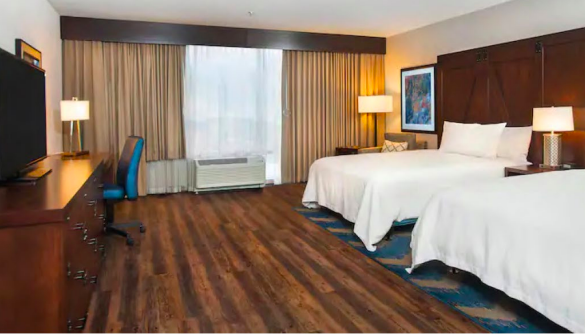 will have an opportunity to indicate whether or not you will need housing for the duration of your program in the Summer Forms within the link provided.
will have an opportunity to indicate whether or not you will need housing for the duration of your program in the Summer Forms within the link provided.
You will also have the opportunity to make a specific roommate request in the forms. Room assignments may not be changed. Payment for the housing rooms should be made directly to the New York Film Academy. Housing is not guaranteed until the New York Film Academy confirms availability and the receipt of the housing payment. The residence is a hotel style with shared rooms.
Each room will include furnishings, a small refrigerator, microwave, wifi, and a bathroom.
We will take students on a shopping trip on their arrival day to purchase any supplies or snacks they wish to keep in their room.
2025 PRICES
Please note: There may be a slight increase increase for 2026.
1-WEEK SHARED ROOM $1,417.50*
3-WEEK SHARED ROOM $4,095.00*
6-WEEK SHARED ROOM $8,190.00*
(*Depending on Availability, Housing fee is non-refundable.)
PLEASE NOTE: In addition to the housing fee, a $250 room and key deposit is required.
YOUR CREDIT CARD WILL BE CHARGED FOR THE DEPOSIT. THE DEPOSIT IS REFUNDED IF THERE IS NO DAMAGE DONE TO THE ROOM AND ALL KEYS AND ACCESS CARDS ARE RETURNED.
All deposit refunds will be processed at the end of the summer and will be returned shortly thereafter.
Residential students will receive additional communication once a Housing Deposit is placed. Which will include move-in date, time, and specific location details.
SUPERVISION
There will be a staff of residential advisors living in the residential housing and providing supervision. They also lead activities in the evenings for all programs and on weekends for programs longer than one week. There is always a residential advisor on duty. An RA hotline number will be given to you at registration and orientation.
No student is allowed to leave the buildings alone. “Buddies” (two or more students) sign out together and sign back in as a group. Students with cell phones are asked to have their phones charged and on at all times.
If there are any questions regarding supervision, please feel free to contact us.
ACTIVITIES
On weeknights, residential students may participate in supervised activities such as sightseeing, game nights, seeing classic and new films at the theater, or neighborhood tours (Hollywood, Santa Monica, etc). On weekends, our residential staff will lead the six and three-week students on excursions. These activities may include a day at Six Flags with tickets for rides, a scavenger hunt in Griffith Park, or other all day excursions. Sundays are generally optional outings to the incredible museums Los Angeles has to offer. All activities are included in housing prices.
Students who opt to participate in our Residential Housing program in Los Angeles will receive further details on the facility, rules and resources available at the residence through their student portal leading up to the program start.
Meals (Commuting Students)
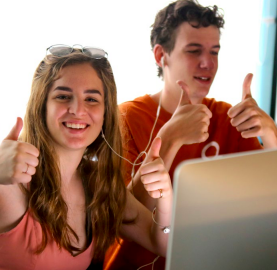
Meals and snacks are not included in the tuition cost.
During lunch period, students can explore the cafés and restaurants near our campus in Burbank. Within a five-minute walk, students can access a Whole Foods with a hot buffet and large outdoor patio, Chick-fil-a, Weinerschnitzel and a cafe called The Commissary. Additionally, on the third floor of our building at Riverside, students can visit George’s Cafe which offers a variety of snacks, drinks and sandwiches. Many commuting students also choose to pack their lunch and enjoy it at our cafe tables inside or in a nearby courtyard with their classmates.
For snacks and beverages during school breaks, there are vending machines within the building as well as George’s Cafe on the third floor. Cafe meals are available on a first-come, first-serve basis. Students are also welcome to bring packed lunches and sit outside or in a dining area provided in the building to enjoy their meal.
Since NYFA Los Angeles teen camps’ inception, we have allowed students to patronize local eateries. Our staff is well versed in the supervision of teen students during meals. Students are required to sign out with our residential advisors, and must utilize the “buddy” system and be accompanied by at least one other student while outside the building.
Getting There
Students who reside at the residence will be shuttled to campus together. Transportation is provided to housing evening weekend activities.
For commuting students, please make all transportation arrangements before the program begins. It is important that all students arrive on time every day (by 9 or 9:30 a.m. as set by the program schedule) and have transportation available to return home at the end of the day. Classes will end at 5 p.m.
Classes will take place at our main building: 3300 W Riverside Dr, Burbank, CA 91505
Medical Care
If students find themselves in need of medical attention, they must immediately advise office staff or a residential advisor. Arrangements will be made to escort the student to the nearest medical facility.
Remember to fill out the medical information form in the Applicant Portal and upload the front and back of your insurance card.
Please bring a supply of any prescription medicine you will need. Students are required to self-medicate.
Please inform us of any allergies you may have on the Medical Release Form (to be completed online).
We suggest you contact your insurance provider if you are unsure whether your policy covers you in Los Angeles, CA.
Rules & Regulations
For a detailed list of rules, please see the Camper/Parent Handbook in the Applicant Portal. Remember, the form must be (digitally) agreed to by both parents and students!
By signing, you acknowledge that you have read and agree to the rules set forth there. NYFA reserves the right to present additional rules/regulations at registration. These will be reviewed at orientation on the first day of the program.
Please keep in mind that the rules exist to make sure that everyone is safe and that the programs run smoothly. Our rules have never prevented any student from having an incredible experience!
All film shoots are supervised by an adult teaching assistant. Excluding lunch and breaks, at no time are students allowed outside of the school grounds without special written consent from a parent or guardian beforehand.
During camp hours, students are not allowed to leave the buildings alone. “Buddies” (two or more students) sign out together and sign back in as a group. During lunch, students will be required to check out with at least one other student and return to campus with that student at the end of lunch break. Students with cell phones are asked to have their phones charged and on at all times.
The visual and performing arts are a collaborative field. Students are required to treat their fellow classmates, their teaching assistants and their instructors with the level of respect they expect to receive themselves.
Students who are consistently tardy, irresponsible, or disruptive run the risk of being removed from the program. Likewise, intolerance shown in regards to race, ethnicity, religion, gender or sexual orientation may result in expulsion.
DRUGS & ALCOHOL-ZERO TOLERANCE POLICY
Drugs and alcohol are strictly prohibited. Students found with drugs or alcohol in their possession will be immediately expelled from the program at their and/or their parents’ expense.
This includes procuring drugs or alcohol for someone else, even if you personally did not partake in their consumption.
There will be no exceptions. Expelled students will not receive a refund of any kind.
Departure
Commuting students finish the program on the last day of class (Friday). Residential students’ departure date is the last day of the listed program dates (Saturday). We cannot accommodate departures after or before your program’s end date. Residential students must check out of their room by 11 a.m. on their program’s end date.
Parents transporting students by car or traveling together by bus or plane should pick up their teen by noon on Saturday. Students flying alone will have the opportunity to utilize our airport transportation for their departure. Please be sure the departure flight information is provided to us in the Applicant Portal in the Arrival & Departure section. Please book a flight to depart no later than 3 p.m. on your departure date. All airport shuttles will depart no later than noon.
International Students & Travel/Visas
Campers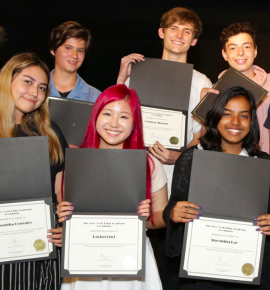 should travel on a tourist visa or visa waiver* to attend the summer teen programs. When you enter the U.S., you should state that you are attending “SUMMER CAMP.” The camps are classified as recreational in nature and not academic, so student visas are NOT needed! You should not say you are coming to the U.S. for school! You are coming to CAMP!
should travel on a tourist visa or visa waiver* to attend the summer teen programs. When you enter the U.S., you should state that you are attending “SUMMER CAMP.” The camps are classified as recreational in nature and not academic, so student visas are NOT needed! You should not say you are coming to the U.S. for school! You are coming to CAMP!
Please make sure the camper’s passport is valid for at least six months past the intended departure date. Please note, if you are from a country where tourist visas or a visa waiver are not easily obtainable, then we can provide a letter to the consulate.
* VISA WAIVER
The visa waiver allows entry to the U.S. for up to 90 days without a visa for citizens of the following countries: Andorra, Australia, Austria, Belgium, Brunei, Chile, Croatia, Czech Republic, Denmark, Estonia, Finland, France, Germany, Greece, Hungary, Iceland, Ireland, Italy, Japan, Latvia, Liechtenstein, Lithuania, Luxembourg, Malta, Monaco, Netherlands, New Zealand, Norway, Poland, Portugal, San Marino, Singapore, Slovakia, Slovenia, South Korea, Spain, Sweden, Switzerland, Taiwan, United Kingdom.
Facts about the Visa Waiver:
Travelers must have a valid Electronic System for Travel Authorization (ESTA) approval prior to travel and meet all requirements. If you prefer to have a visa in your passport, you may still apply for a visitor (B) visa. The visa waiver CANNOT be extended. It is important not to overstay your visit or else you will not be able to use the visa waiver ever again. If you are planning a stay longer than 90 days, then you must apply for a tourist visa.
Important Contact Info
Switchboard:
818-333-3558 or 888-988-NYFA(6932)
NYFA LA Main Office Address:
New York Film Academy
3300 Riverside Drive
Burbank, CA 91505
General Questions:
Email: [email protected]
NYFA Website: nyfa.edu/summer-camps
Director of Youth Admissions: John Sagona
Director: Chris Pettoni
Checklist
Your tuition balance is due 30 days before the start of your program.
- Confirm that your health insurance covers you in Burbank, CA.
- Complete your Summer Forms in the Applicant Portal (housing request, airport pick up and drop off, medical conditions or allergies, etc.)
- Residential students can ONLY arrive on the Sunday of their program start date. They MUST depart on the Saturday their program ends.
- Please note any allergies / medications on the Medical Release form.
- Inform NYFA of any changes to your address, email or phone.
- Parents/guardians and campers should keep a copy of this packet for future reference.
- Please contact us with any questions or concerns.
Camp Director Bio
Christopher Pettoni is a writer, filmmaker and educator based in Los Angeles who has been a member of the NYFA community since 2016. He received a BFA in Film and Television Production from NYU’s Tisch School of the Arts and an MFA in Screenwriting from California State University Northridge.
Packing List
- Warm weather clothing and layers for cooler nights
- Comfortable shoes
- Sunscreen
- Rain gear
- Bathing suit
- Sweatshirts for the classroom/cool nights
- Water bottle
- Cell phone and chargers
- Universal adapter for international students
- Debit card or spending money
See the next section for any particular items specific to your program!
WE LOOK FORWARD TO MEETING YOU THIS SUMMER!
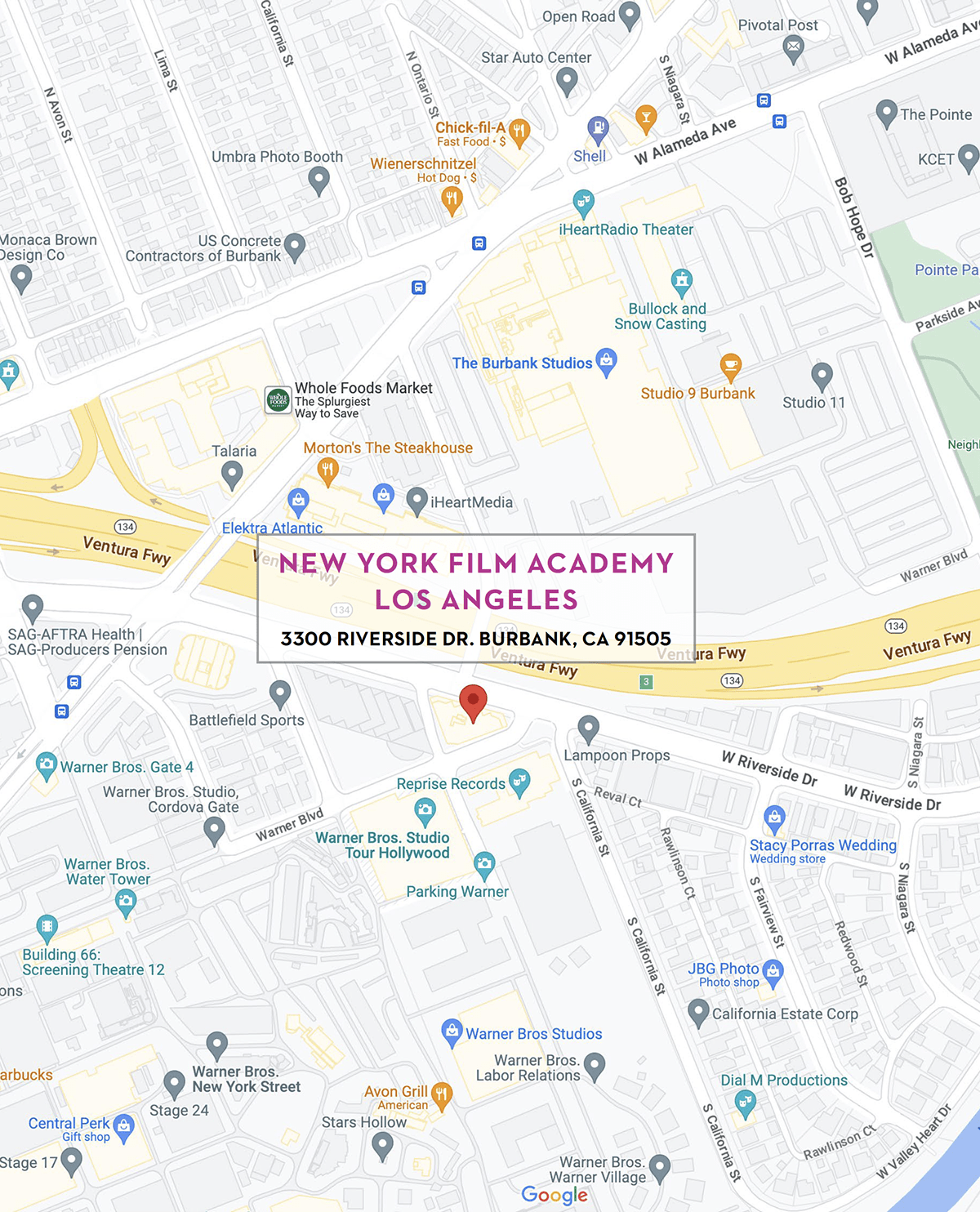
Preparation
We look forward to seeing the amazing work you will produce during your camp experience. Please read through the section designated for your program in the following pages. We have outlined information for you to best prepare for your camp.
FILMMAKING STUDENTS
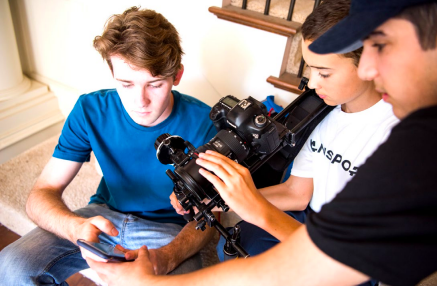 Prepare by writing down any story ideas, character notes or other film-related thoughts. While these ideas will evolve once the program begins, it will be a great help to have something prior to starting the workshop. In Level I film programs, students make films that feature visual action, music and sound FX, but no recorded dialogue. So, remember to think visually! Begin to consider music tracks you may want to incorporate into your final film.
Prepare by writing down any story ideas, character notes or other film-related thoughts. While these ideas will evolve once the program begins, it will be a great help to have something prior to starting the workshop. In Level I film programs, students make films that feature visual action, music and sound FX, but no recorded dialogue. So, remember to think visually! Begin to consider music tracks you may want to incorporate into your final film.
Story is the most important element of filmmaking. Inevitably, ideas will develop as inspiration hits, and we encourage filmmakers to begin to keep track of their ideas through writing. We recommend students keep a diary and discuss evolving ideas with friends and classmates. In class, instructors will help students translate their ideas into moving images. While students can write freehand in notebooks, it can be easier to work on your scripts with a tablet or laptop. Bring one if you own one!
While there is no required reading, we have found the following books to be excellent resources: “Film Directing: Shot by Shot” by Stephen Katz, “The Art of Dramatic Writing” by Lajos Egri, The “Filmmakers Handbook” by Edward Pincus and Steven Ascher, “Making Movies” by Sidney Lumet and for screenwriting, Lew Hunter’s “Screenwriting 434”.
We suggest that students write a one-page outline of a short film story and bring this with them to the first day of class. This draft should have no dialogue, utilizing only visual and physical action. Students should be creative and keep the story simple. Students can use this story as a starting point for any of their projects. Please come prepared, but with an open mind.
We will provide a flash drive or an online link to all students with their final project(s) so they can be easily accessed when the program ends. However, if students wish to take home their raw footage and the films of their classmates, we highly recommend bringing a 16 GB USB flash drive or portable hard drive.
Filmmaking students may incur additional expenses for their productions. Expenses may be for things like costumes or props. Please plan accordingly, and consider writing scripts that call for minimal expense.
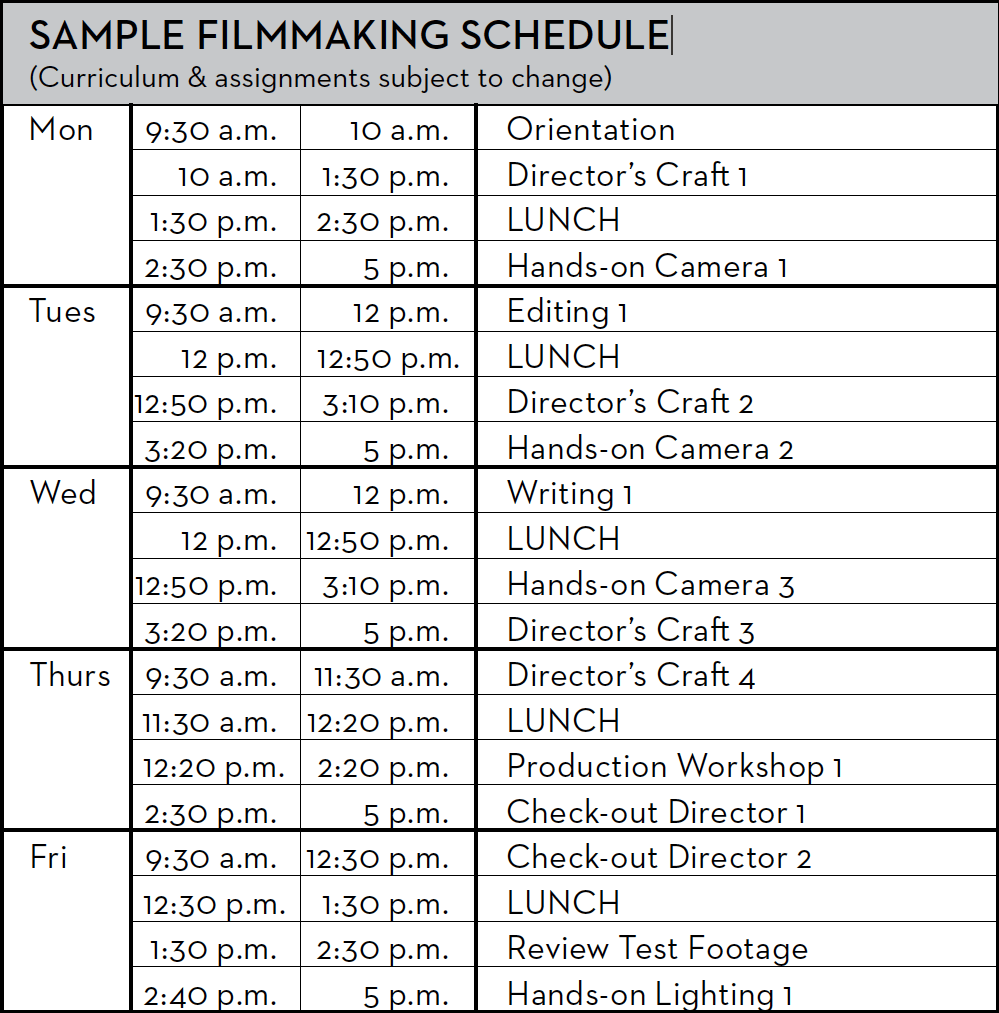
ACTING FOR FILM STUDENTS
Acting for Film students can prepare by watching their favorite actors, then reflecting on what it is about the performance that makes the actor so captivating. Students should note specific scenes that move them.
For books on acting and technique, feel free to look at: “Respect for Acting” or “A Challenge for the Actor” both by Uta Hagen, “On Acting” by Sanford Meisner or “A Dream of Passion” by Lee Strasberg.
No experience is necessary to succeed in our Level I Acting for Film program. However, you must come prepared to work in a collaborative and supportive environment.
Be prepared to expand your comfort zone and jump into new experiences. This is an exciting and personal program. Be ready to explore body movement, voice techniques, scene study, improvisations and of course, acting for the camera. All students should bring comfortable clothes that allow for a full range of motion.
Actors should bring a notebook and pen to every class.
We will provide a flash drive or an online link to all students with their final monologue and/or scene(s). We highly recommend that 3-Week and 6-Week acting students bring a USB flash drive (at least 16 GB) onto which they can upload all of their raw footage and filmmakers’ projects.
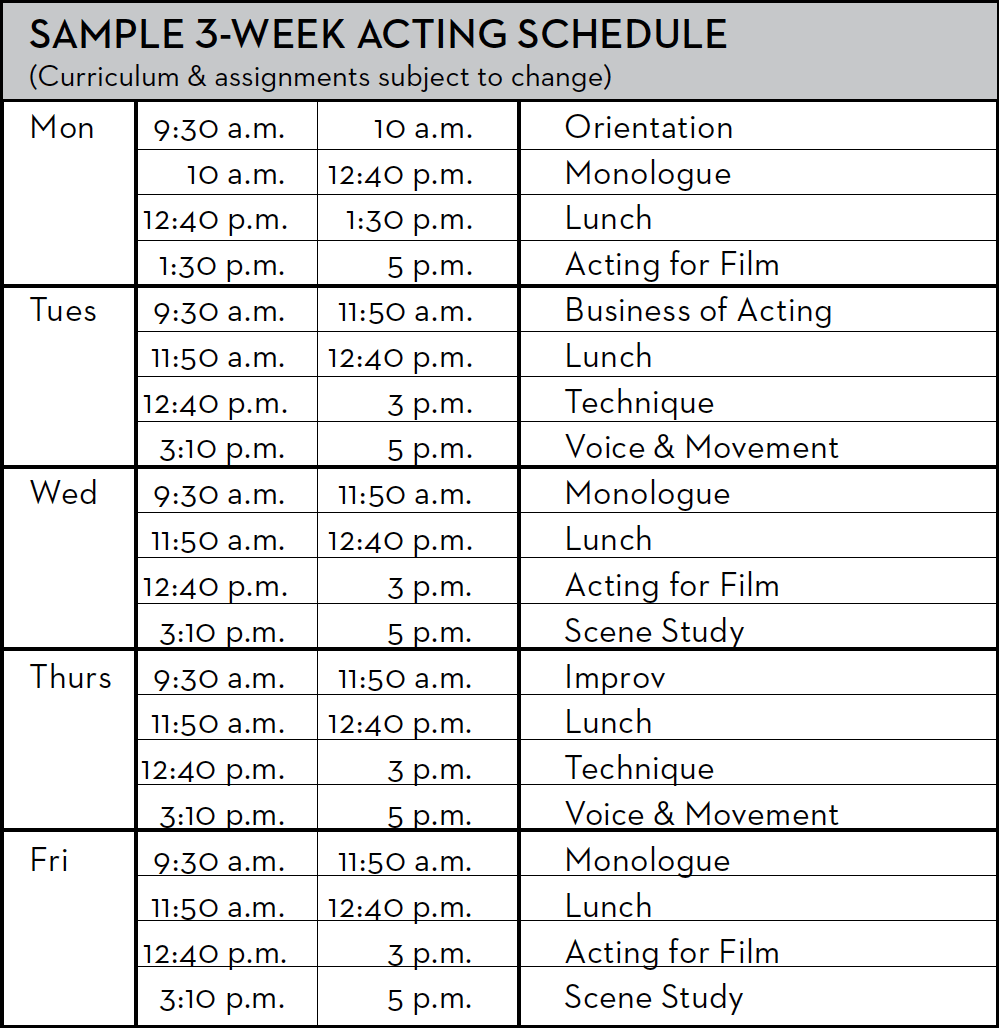
ACTING FOR FILM II STUDENTS
During the months before the workshop, Acting for Film II students can prepare by studying their favorite screenplays, teleplays, or theatrical scripts as well as watching well-known performances from films and television shows.
Other suggestions for preparation for our acting for film II camp include:
- Listing performances that moved you. Ask yourself: Why did you connect with that character? If you were cast in that role, what choices would you have made?
- Watch performances from your favorite films with the sound turned off. How is the emotion of the scene conveyed without dialogue?
- Pick a favorite character you would like to play in a movie, TV show, play, or even video game. How would you make the character your own?
We hold the Acting for Film II students to a high standard. As a result, very little time will be spent on review before the challenging material begins. Students will be pushed further and expected to give more.
We will provide a flash drive or online link to all students with their final monologue and/or scene(s). We highly recommend 3-Week Acting for Film II students to bring a USB flash drive (at least 16 GB) onto which they can upload all of their raw footage and filmmakers’ projects.
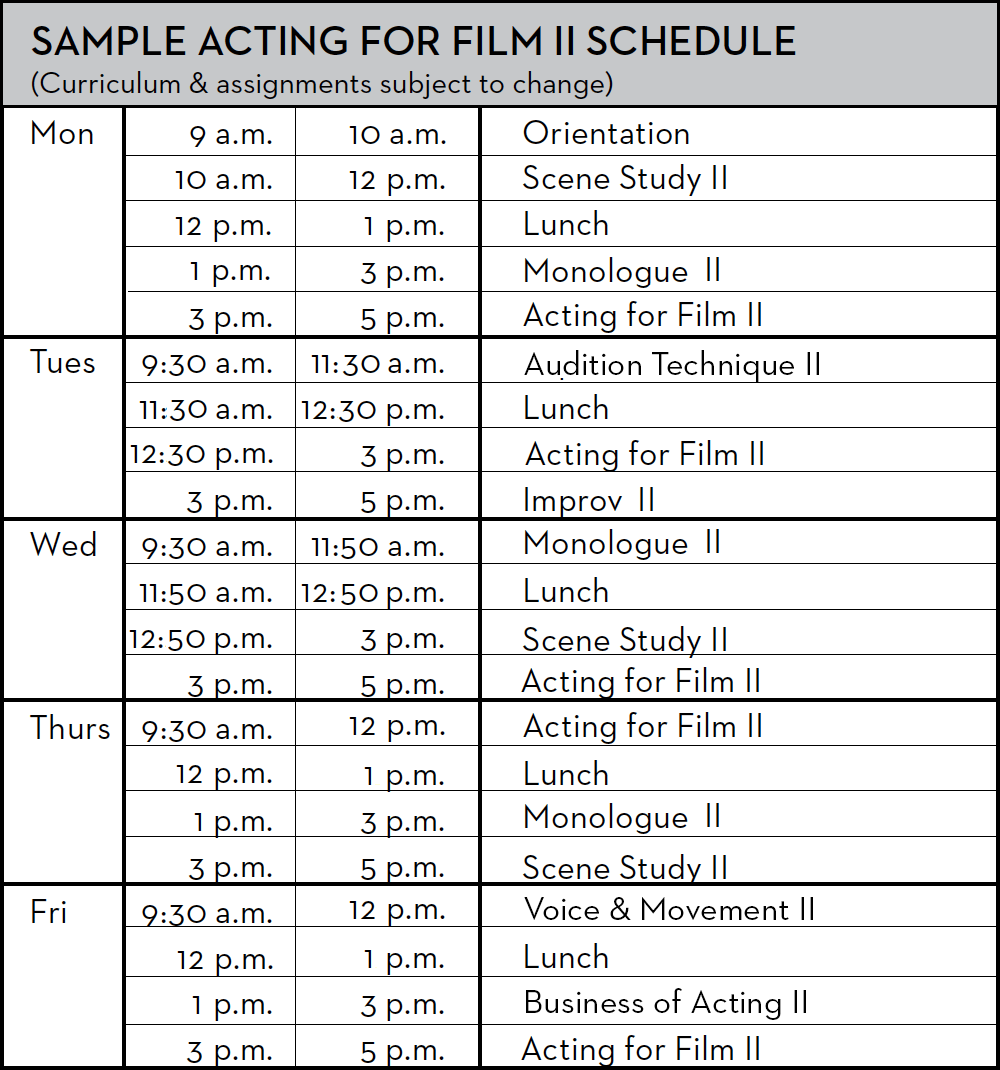
SCREENWRITING STUDENTS
Screenwriting students should begin to read film scripts (found online or in compilations in the bookstore) to get comfortable with the format and language of screenwriting. While we will teach all types of writing, including scenes with dialogue, you will also be shooting one scene focusing on visual storytelling, so students should also strive to note scenes that work primarily through images.
Screenwriters should come up with three ideas for short films (under 20 minutes in length). They should also think about simple ideas that can work for a three-to-five minute film they themselves will shoot.
Beyond that, just bring your ideas, your creativity, and something to write in.*
*While screenwriting students can write freehand in notebooks, it would be much easier to work on your scripts on a tablet or laptop. Bring one if you own one!
We will provide a flash drive or online link to all students with their final project(s). However, if students wish to take home copies of their friends’ work or their raw footage, we highly recommend bringing a 16 GB USB flash drive or portable hard drive.
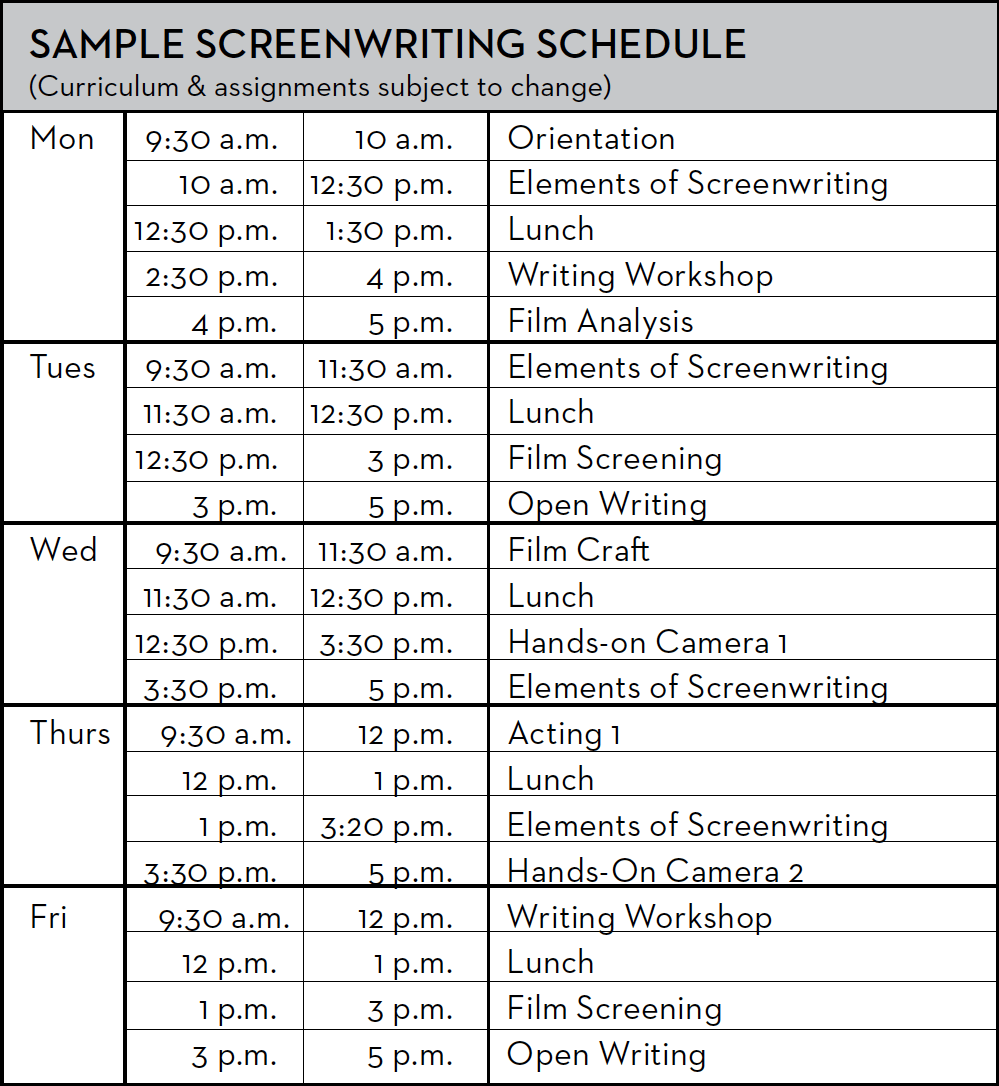
GAME DESIGN STUDENTS
The New York Film Academy Game Design camps are designed to provide campers with a method for building digital and nondigital games, and to teach them the language of playable systems. Campers may want to spend some time playing a variety of games, as well as thinking about ways to change their rules, goals, materials, and space. Any experience playing and making games, making up stories and characters, coding, and creating visual art is an asset, but not required.
Campers will learn to brainstorm, prototype, and build games using the playcentric method of design, making pen and paper prototypes, and crafting digital games using Unity, a highly customizable, cross platform game engine. Campers can get a head start by downloading the Personal version of Unity3D, and experimenting with some simple coding projects like John Conway’s “Game of Life.”
In addition to Unity, we will show young designers how to build a library of sights and sounds for their action-filled visions, teaching skills comparable with those of professional game designers. Campers will learn Adobe Photoshop, the industry-standard 2D graphics software to design and build their game’s art assets. Sound design will utilize Avid ProTools along with midi keyboards to create original sound assets that support their game’s interaction and UI feedback.
Campers are strongly encouraged to bring their own 16-32GB USB drive, where they can store their work.
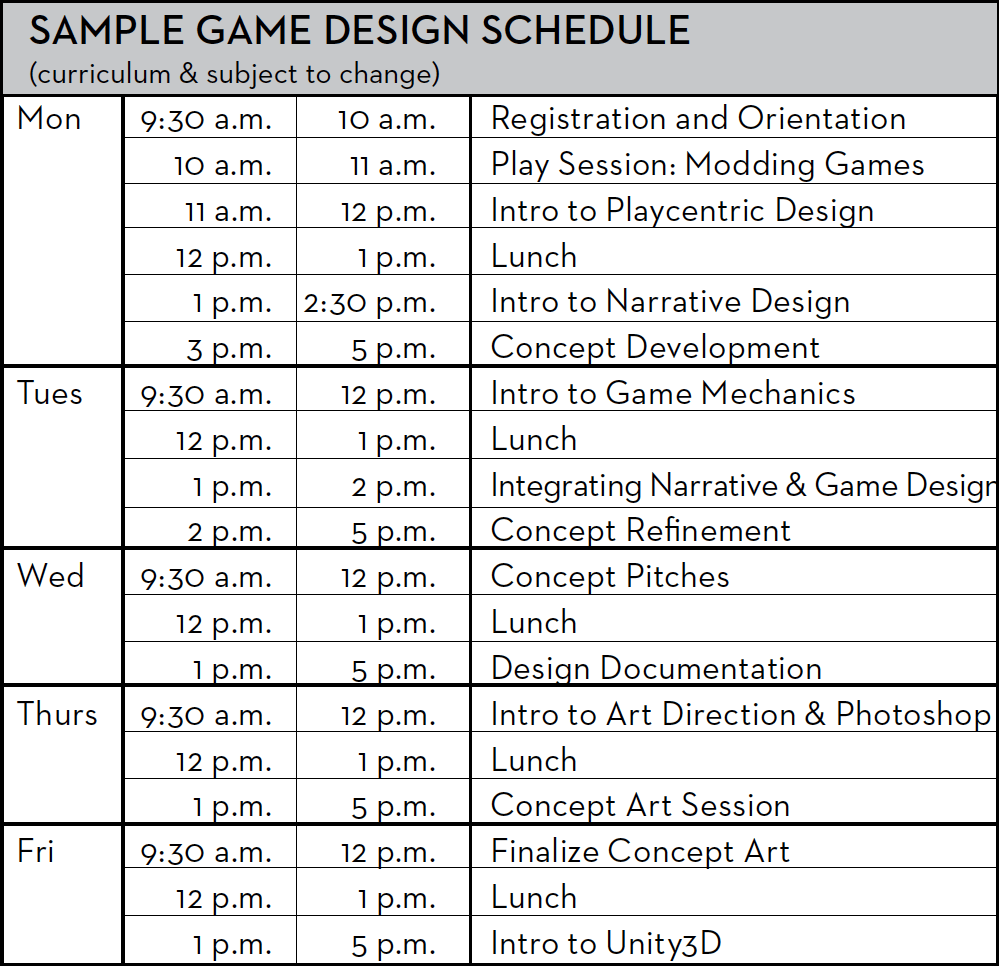
3D ANIMATION
While this is a computer 3D animation program, any visual arts skills will be useful for the course. Students may want to practice drawing and shading before the program begins, and should all bring sketchbooks to class. A working knowledge of Photoshop will also be useful (though not required).
Animators are filmmakers, so any reading on film can help students prepare for the visual requirements of directing. We recommend “Film Directing: Shot by Shot” by Stephen Katz, as well as the other books mentioned in the Filmmaking section above.
For animation-specific reading, we recommend Richard Williams “Survival Guide for Animators”. Students may enjoy watching Chuck Jones’ Bugs Bunny shorts, to understand humor and pose-to-pose animation. We also recommend that students watch anything from Pixar!
We highly recommend that 3D animation students bring a hard drive (at least 1TB) onto which they can upload all of their projects. If students plan to use this hard drive to edit at home, they should bring a professional-level brand (G-Tech, LaCie, and Seagate are proven ones).
